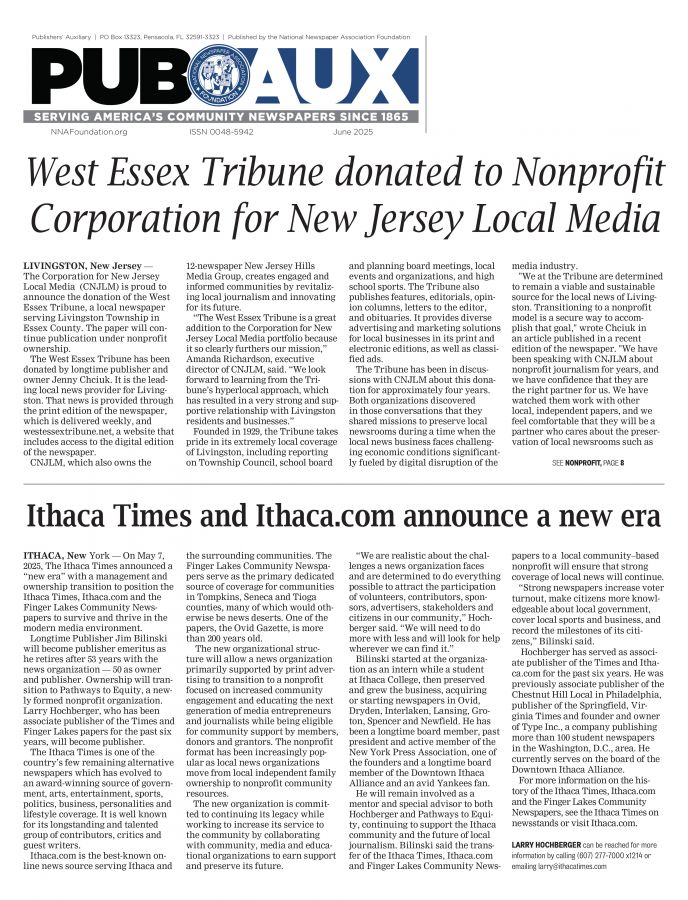NextGen publishers are the face of the future
Nov 28, 2012
By Teri Saylor
Special to Publishers’ Auxiliary
The children at the National Newspaper Association’s NextGen during the 50th Government Affairs Conference program last summer ranged in age from 7 to mid-20s.
“Yes, there were some young kids, but it was cool to include them,” said Ossie Bladine, who was one of those children and chairman of the event that took place July 2011.
“There were young kids, and they weren’t working in the newsroom. Others there did grow up working in the newsroom and it was cool getting together,” he said.
Bladine says he was a paperboy at his family’s newspaper when he was 10 years old, and even at that tender age, people liked to ask him if he was planning to carry on in the family business.
Newspaper publishers have traditionally raised their children in newsrooms, back shops, and circulation departments. Generations of budding publishers and editors grew up going to newspaper conventions on their summer vacations, like those summer camps children look forward to every year, where memories are made and best friends are forever.
That’s how it was for Bladine, but he doesn’t know many others his age, 27, who went to work at the family newspaper.
The newspaper industry is changing.
Fewer family businesses still publish newspapers, and today’s conventions are less about vacation and more about work.
Bladine is news editor at The News-Register in McMinnville, OR, a newspaper that has been in his family since 1928. He is a member of the News-Register’s fourth generation. His father, Jeb Bladine, is the publisher and followed his father in the newspaper’s family tree.
“I knew there was a good possibility I would work in the family business, but I wanted to allow myself to naturally move into it,” he said. “I really don’t feel any pressure, but I know I have a unique opportunity.”
The News-Register dates back to 1866, according to a provenance posted on the newspaper’s website.
It all started with the Lafayette Courier in 1866, which by 1872 had become the Yamhill County Reporter, based in McMinnville. In 1905, the Reporter merged with an upstart newspaper, the McMinnville News, to form the News-Reporter.
Meanwhile, a second branch of newspapers was rolling, starting with the Oregon Register, born in 1881 in Lafayette, OR, and the West Side Telephone, founded in 1886 in McMinnville. Those two newspapers merged to form the Telephone-Register, which was purchased in 1928 by Lars Bladine of Iowa. His eldest son, Jack, came to McMinnville to begin the family operation.
Jack and his brother, Phil Bladine, purchased the News-Reporter and merged it with the Telephone-Register, forming the News-Register.
Jeb Bladine, Phil’s son, joined the newspaper as editor in 1974 and assumed the role of publisher in 1991.
The newspaper started out as a daily, but over the years, the family changed its frequency. Since 2009, the News-Register has published as a semi-weekly, delivered on Wednesday afternoon and Saturday morning. Its circulation is 15,000.
In 2008, the Bladines purchased the Vancouver (OR) Voice, an alternative newspaper. Ossie Bladine was editor in chief.
At the peak of the economic crisis, the Bladines tried to sell the paper, but could not find a buyer and folded it in 2011.
The News-Register has weathered the storm despite the economic woes.
In a piling on of sorts, a new law enacted by the Oregon legislature moved foreclosure proceedings into courtrooms and took foreclosure notices out of newspapers and onto sheriff department websites.
“All newspapers in Oregon took a hit,” Bladine said.
The News-Register made up for the losses by converting its carrier-based circulation program to all-mail delivery on Oct. 31.
“We were the last paper of our size in the state with carriers,” he said, and reports that the transition has been smooth.
“So far, so good,” he said. “The biggest changes were the deadlines, which had to be moved a day earlier.”
He’s glad none of the newspaper’s 45 employees were laid off. Some of them have been part of the News-Register for decades.
Bladine’s formative years in McMinnville were unremarkable.
“There was just the small town stuff. And I played sports as a kid,” he said. “Growing up with a familiar family, people would hear the name ‘Bladine’ and associate it with the newspaper.”
McMinnville is a town of 33,000, located in the heart of Willamette Valley’s wine country and Oregon’s largest American Vitacultural Area, boasting 200 wineries.
The town is about an hour’s drive to the coast and to Portland, and 30 miles from the capital city of Salem.
McMinnville was incorporated in 1876, a century after the Declaration of Independence.
Bladine majored in political science at the University of Oregon, but left school to work for the Vancouver Voice. He plans to complete the hours he needs to get his degree.
He was in the second grade when he first encountered the Internet, communicating with his teacher online.
The News-Register has become a leader in online journalism, and Bladine doesn’t have to use his imagination to understand the power of interactive media.
The newspaper company helped create McMinnville’s largest Internet service provider, McMinnville Access Company, or OnlineNW, according to the newspaper’s website. It also did the most recent redesign of the National Newspaper Association’s website.
The News-Register’s digital media division provides Internet-related services to other newspapers and publications, including online content management systems and website maintenance services.
“My generation has come up with multi-media,” Bladine said. “This new and crazy thing has grown as we have grown, and it is part of our nature. But that’s not to say we know what to do with it.”
Still, Bladine is hopeful about print.
“I’m not convinced print will be dead in my lifetime. It is entrenched in the market,” he said. “But we’re finding the more and more we go, the more people will see print news and online news as equal.”
This is why Bladine is not wrestling with the decision to put up a paywall for the News-Register’s online edition.
But he wants to use social media outside the paywall to create online communities around the news.
“We use social media as an outlet and a way to present news. It is a way to get news out to more people, especially younger people. We use it to create online communities, and to interact with local businesses,” he said.
He is working on creating a community blog to create open sourcing for news and information.
“This is a good time, and an interesting time to be out here rolling with the punches and seeing all of the changes first hand,” Bladine said. “It is fun being part of the newspaper. People love the idea of the newspaper. They still love the news, and they still love the institution.”
terisaylor@hotmail.com







